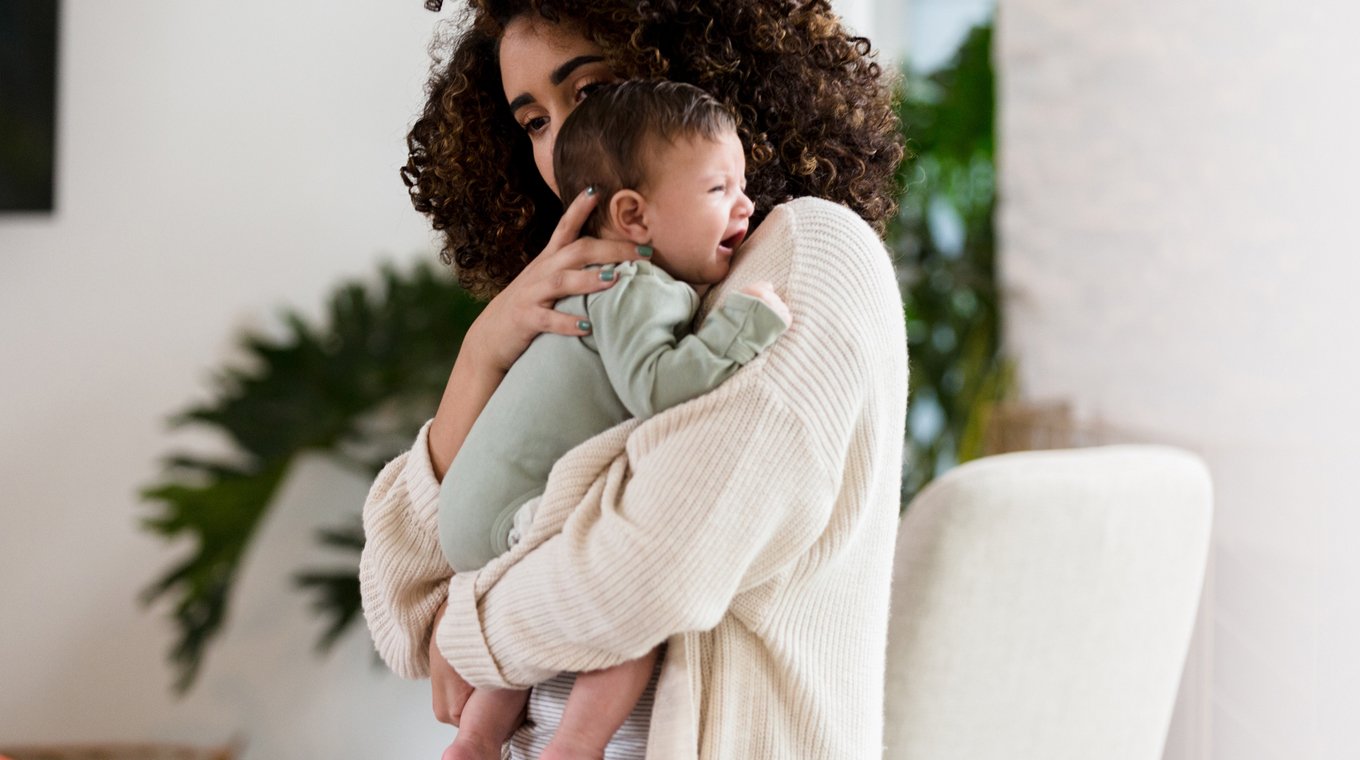
In this article
I never really thought about crying as a language when my son was a baby. Yet, when he cried, I usually tended to the actual need, suggesting I could tell the difference between a hungry cry and a sick cry. Maybe I got lucky and didn’t think too much about the cries; I knew he had a schedule that he often followed, from hunger to dirty diapers to sleeping.
Mom of two Morgan Price thinks that babies definitely use their cries to signal their needs. “I believe that skin-to-skin contact from day one helps moms to be in tune with their babies and that they will soon learn to distinguish the cries as they grow in relationship with their baby,” Price told Mom.com. “I was able to distinguish the cries of both my babies within a week or two of caring for them around the clock.”
Sometimes moms just don’t get that quality bonding time with their baby for a number of reasons; if you are trying to decipher what your baby’s cries mean, here are some insights.
What your newborn's cries might mean

There are common reasons why babies cry, and by learning what they are, you can start to decipher what makes one cry different from another. It’s important for moms to know that you aren’t spoiling your baby by tending to his cries. He’s crying for a reason, and you should do what you need to in order to alleviate his frustration, discomfort, or pain.
The common reasons a baby cries include:
- I’m hungry: This cry often starts with the sound “neh” as baby starts to touch his tongue to the roof of his mouth enabling the sucking reflex.
- I’m tired: This cry often starts with the sound “owh” as she rubs her eyes and yawns.
- I’m uncomfortable: This cry starts with a “heh” and indicates discomfort such as having a dirty diaper or being cold, itchy, or otherwise uncomfortable.
- Something hurts: This cry starts with the sound “eair” that could be abdominal gas or an earache. This cry is often accompanied with brash leg movements.
- I’m sick: This is often a weak cry starting with “eh.” While this often denotes feeling sick, it could also mean your baby needs to burp if she just ate.
Some babies will cry while pooping because they are having a hard time squeezing the poop out. Babies may not have the coordination to squeeze their stomach muscles while relaxing their anus. If your baby is struggling to poop, he may also have a hard stool and be dehydrated. Talk to your pediatrician if you suspect this.
Look at your baby to get visual cues as to why she might be crying as well. Checking a diaper takes a second and most moms learn the feeding schedule pretty fast. Your baby will likely rub at her eyes if she is tired. Babies who are in pain will either kick their legs (abdominal pain) or rub their ears (earache). These are other ways to learn what your baby’s cries mean even if you can’t discern the cry itself.
Sometimes it's just a cry: When your baby cries for no reason

There are times when a baby cries and there is apparently no reason for it. Often babies who cry for two to three hours at least three days a week are said to have colic. A colicky baby often cries in the afternoon or evening for hours on end with no amount of rocking or cradling helping to soothe them. This can be scary, frustrating, and exhausting for parents. Dr. Michael E. Platt told Mom.com that colic “often occurs in the evenings, causing parents to lose sleep. It peaks in infants when they are about six weeks old.”
Let’s be honest, not everything about motherhood is intuitive. In fact, little is. Learning the little things that help you better communicate with your baby will help you bond better and be less anxious when your baby cries. “Typically, after age two months, some moms will begin to learn and interpret a baby’s crying,” Dr. Lisa Lewis, M.D. told Mom.com. “But many Moms will never be able to interpret their baby’s crying, and that’s OK.”
Is that cry something serious? When to call the doctor

Sometimes a baby’s cries may signal that something more serious is going on. If your baby is crying and it’s not because of any of the reasons mentioned above, or if nothing soothes her or she has other symptoms — you may need to call the doctor. Symptoms that warrant a doctor’s call include:
- Very weak
- Has a fever
- Has a swollen soft spot or scrotum
- Vomits
- Cries when being held or touched
- Cries for more than two hours
- Drinks little or nothing for more than eight hours
These could be symptoms that something else is wrong with your baby, and consulting a doctor is the best bet.







